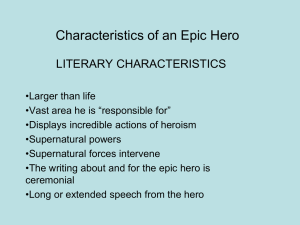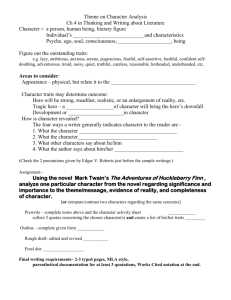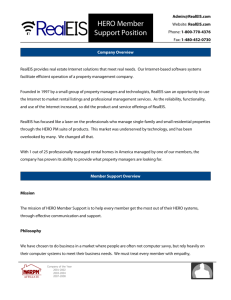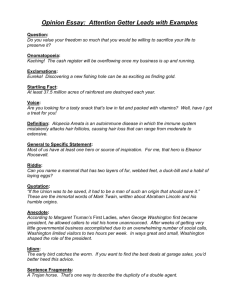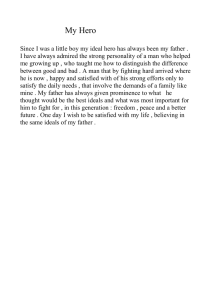The Epic Hero
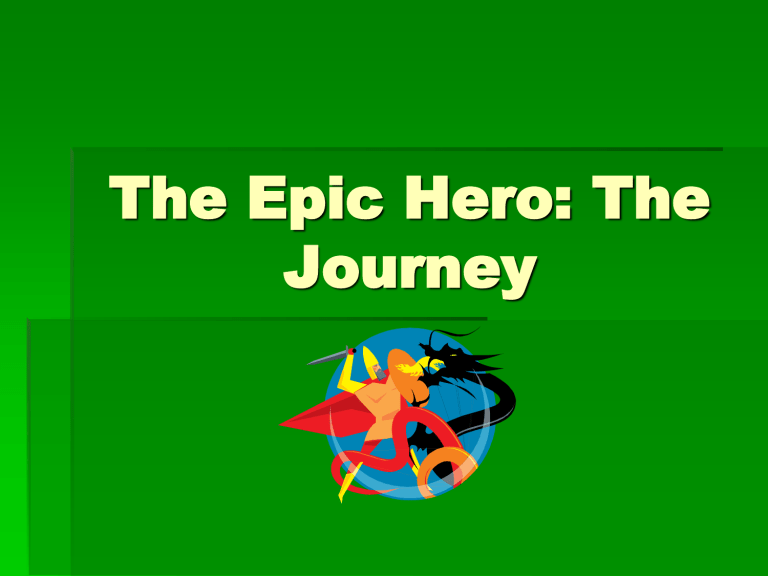
The Epic Hero: The
Journey
Prepare for Notes
1.
Take a sheet of notebook paper out.
2.
Fold the paper in half vertically (like a
“hotdog”).
3.
Label the left column “NOTES ON
HEROES”
4.
Label the right column “MY
THOUGHTS, EXAMPLES, OR
CONNECTIONS”
A Call to Adventure
“You must go with me to Alderaan.” -Obi-Wan Kenobi
The hero starts out living an ordinary life.
He or she is called to go on a quest, often by a
“mentor.”
Glinda the Good Witch tells Dorothy she must visit the Wizard of Oz
Obi-Wan Kenobi asks Luke Skywalker to help destroy the
Empire
Gandalf enlists Frodo’s help to destroy the One Ring.
The hero might doubt that he or she is capable of completing a quest, and “refuse the call.”
However, the mentor encourages the hero or even gives magical items to help.
The Hero’s Journey
“We’re off to see the Wizard.” -Dorothy
The hero goes through many trials on his or her way to achieving the quest.
“Threshold guardians” will block their way to new places. The hero must either outsmart or defeat them.
Allies join the hero to help.
The Tin Man, Scarecrow, and Cowardly Lion help Dorothy
Luke and Obi-Wan hire Han Solo and Chewbacca
The Fellowship of the Ring journey with Frodo
Claiming the Prize
“What have you learned, Dorothy?” -The Tin Man
The hero defeats the shadow and is able to finish his or her quest.
The hero returns back home as a different person then when the quest started.
Sometimes the mentor or the allies leave the hero, knowing that the quest is completed.
There and Back Again
“There’s no place like home.” -Dorothy
Others may not recognize the hero when he or she returns home because the hero has changed.
Sometimes the hero has to clean up or fix something that happened to his or her hometown when the hero was on the quest.
The hero has help along the way from magical items, mentors, and allies, but it is ultimately what’s inside the hero that helps the hero win.
Hero Characteristics
The hero is introduced in the middle of the story’s action; previous events will be recounted in flashbacks.
The hero is not only a warrior and a leader, but also a polished speaker.
The hero, often a demi-god, possesses weapons of great size and power, which are often presents from the gods.
Odysseus’ bow
The hero must undertake a long, perilous journey, often involving a descent into the Underworld, which tests his endurance, courage, and craftiness.
Characteristics of
Epic Poetry (Will be tested!)
Epic poetry often begins with an
“invocation,” which is when the narrator calls on creative help to tell the story.
Epic poems often begin “ in media res ,” which is Latin for “in the middle of the action (story).” This means a good part of the story has already happened and the narrator begins the poem by catching the reader up on what’s happened.
Characteristics of
Epic Poetry (Will be tested!)
The Epic or Homeric Simile is an extended comparison beginning with "like" or "as"
The simile is loaded with description, often holds up the action at a crucial point to produce suspense, and continues for several lines.
Epithets are short phrases that refer to the character’s traits.
“ rosy-fingered Dawn ” to describe the sunrise, “ swift-footed
Achilles” to describe the qualities of Achilles


